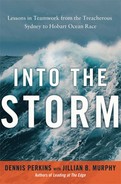28
![]()
Introduction to the Strategies
Alot of things need to go right for a boat to win the Tattersall's Cup. The vessel itself has to be structurally sound, and technology makes a difference. The sport is constantly innovating and—even though each boat is given a handicap—it's unlikely that a boat in poor condition held together with duct tape will be victorious.
The sailing skill of the crew is fundamental. These seamanship skills can be related to specific competencies, such as the ability to steer in heavy weather or navigational savvy. And they can also be more general capabilities developed through experience in ocean racing—particularly in tough races such as the Hobart or the Fastnet.
Winning boats often rely on a support team that extends beyond the crew sailing in the race. Meteorologists can interpret and relay weather information to boats that have the right information technology. This was an advantage of enormous benefit to Sayonara in the 1998 Hobart. Ellison and his crew were making decisions based on the advice of “Clouds” Badham, while following the storm on a computer screen. Lacking that level of support, AFR Midnight Rambler relied on intermittent and somewhat confusing forecasts from the Bureau of Meteorology.
The skipper of a boat can also be critical. The leader sets the tone and can have a direct influence on the outcome of a race. A volatile personality or a disorganized leader will put the team at a significant disadvantage. And an experienced skipper, one that people enjoy sailing with, can have the opposite effect.
And, of course, there is Huey—the weather god. For me, Huey has become an icon for a more general collection of things that could be called luck or chance. In the ‘98 Hobart race, the big maxis were fortunate because they missed the worst of the storm. In other races, Huey might smile on a boat of a different size. And there are the rogue waves, with their unpredictable patterns. Any crew hit by a huge wave in hurricane force winds could fall victim to bad luck.
Chance plays a role in any victory. But Roger Hickman, a veteran of thirty-four Hobarts, observed:
With an event like the Sydney to Hobart Race, luck plays a part. But if you're not smart enough or good enough or professional enough to be in the right place at the right time, you won't get lucky either. If you work very, very hard and have a good team around you, you will get luckier. The harder you work, the luckier you get.1
As Hicko notes, teamwork is a critical ingredient in the record of successful boats. A well-built boat with the best technology and skilled sailors can win if they are lucky enough. A good skipper can help create a good team. But if there are fundamental problems of teamwork, it will be extremely hard to win races. And it will be difficult to get people to return to the boat for future races and to maintain a record of success.
It's clear that teamwork is important, but efforts to understand the characteristics of effective teams can be confusing. We are immersed in a constant stream of articles, books, and webcasts—each one purporting to provide authoritative advice. Yet the prescriptions are frequently different. And sometimes the same expert seems to say different things at different times.
These variations or inconsistencies can be troubling. How can we really know that findings are fully grounded in reliable evidence? How can we know when the theories we are reading about are valid? And how can we be sure that insights about teamwork are both well thought out and helpful?
Neither academic credentials nor persuasive writing can guarantee the validity of anyone's perspective. But there are some questions worth considering before reaching conclusions about effective teamwork. There are some challenges that need to be understood.
